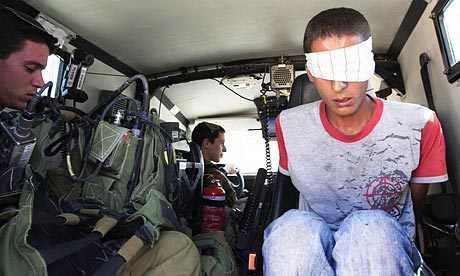
Palestinian detainees are systematically denied the right to meet a lawyer during interrogations by Shin Bet, the Israeli internal security service, according to a report published today by an Israeli and a Palestinian rights group.
The Public Committee Against Torture in Israel (PCATI) and the Palestinian Prisoners' Club say detainees from the occupied West Bank are cut off from the rest of the world in Israeli detention facilities. The report also cited cases of "systematic violence" and torture.
Between 70% and 90% of the detainees in the years 2005 to 2007 were not allowed to meet a lawyer able to provide advice and assistance prior to signing a confession, say the organisations. The average time prisoners represented by the group were isolated from the outside world was 16.7 days. Irit Ballas, a lawyer and one of the report's authors, said the situation has remained the same for the past three years. "The information we receive from our lawyers tells us that the incommunicado detention has not decreased," he said.
Shin Bet refuses to reveal the number of detainees who had no access to legal services. Asked about the report, the agency said: "One of the tools, used in accordance with the law, is the authority to prevent meetings with a lawyer for a period of time established within the law." Shin Bet added: "The accusation that denying access to lawyers was being used to prevent the monitoring of 'mental and physical abuse' is completely baseless."
In Israel, the legal period for detention in isolation is 48 hours for so-called regular violations and up to 21 days for "security" violations. In cases where military law applies, it can reach 90 days.
"All the detainees who testified reported grave negative consequences of being held incommunicado, emphasising the feelings of fear, helplessness, confusion and despair," says the 67-page report.
The document lists other forms of ill-treatment during the interrogation: "painful and prolonged shackling to a chair, painful cuffing of the hands, sleep deprivation, repeated threats to harm the detainee and his family, the conditioning of meeting an attorney with confession, giving of false information to the detainee and intentional deception of the detainee".
The report reproduces, among others, the testimony of Ziad Shanti, 32, from Qalqilya in the West Bank, who was arrested in October 2006 while walking down the street with his friends. He was seriously injured during the arrest by two bullets. He was forbidden contact with his family or with a lawyer for 40 days, even during his stay in hospital and later while in a cell with no windows.
"I asked [repeatedly] for them to inform my mother that I am alive. The interrogator said he would allow this only after I confess … the interrogator took me to the interrogation room and shackled me to the chair with handcuffs. I stayed until 3am and was then returned to the isolation cell. Around 8am I was taken to interrogation."
The sessions were repeated for several days. Shanti confessed. He was sentenced to five and a half years in prison for stealing a truck and harbouring activists from the al-Aqsa Martyrs' Brigades

No comments :
Post a Comment